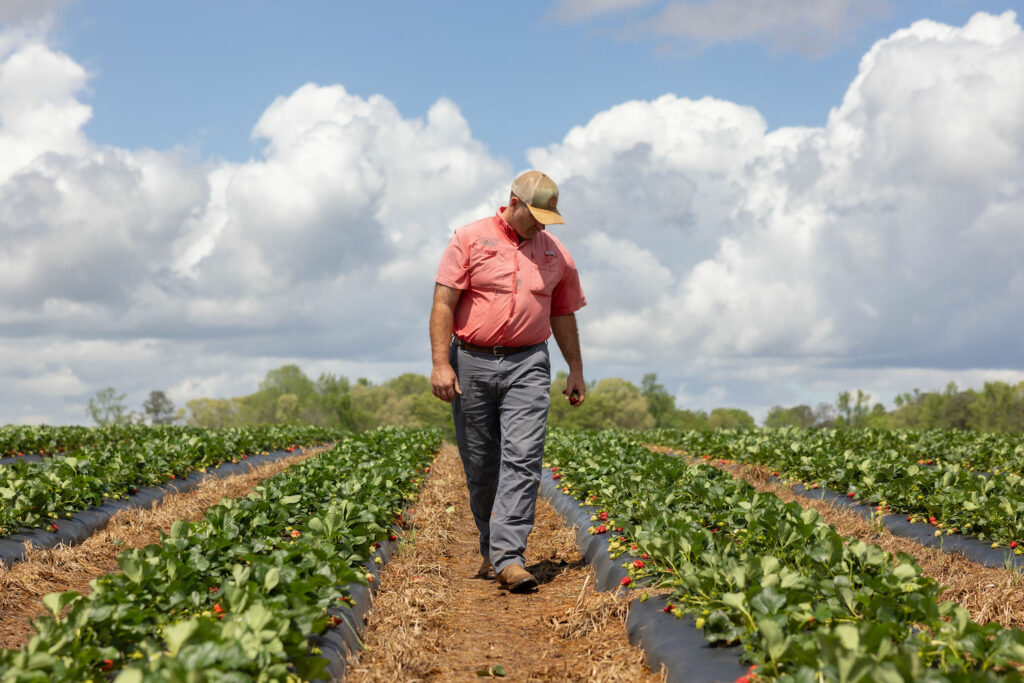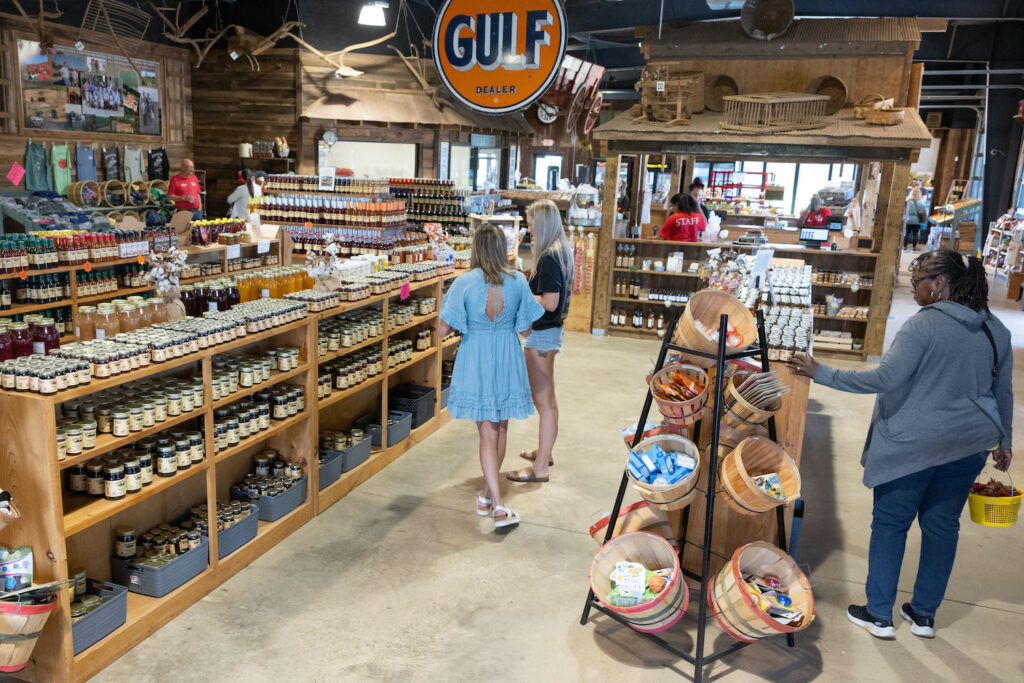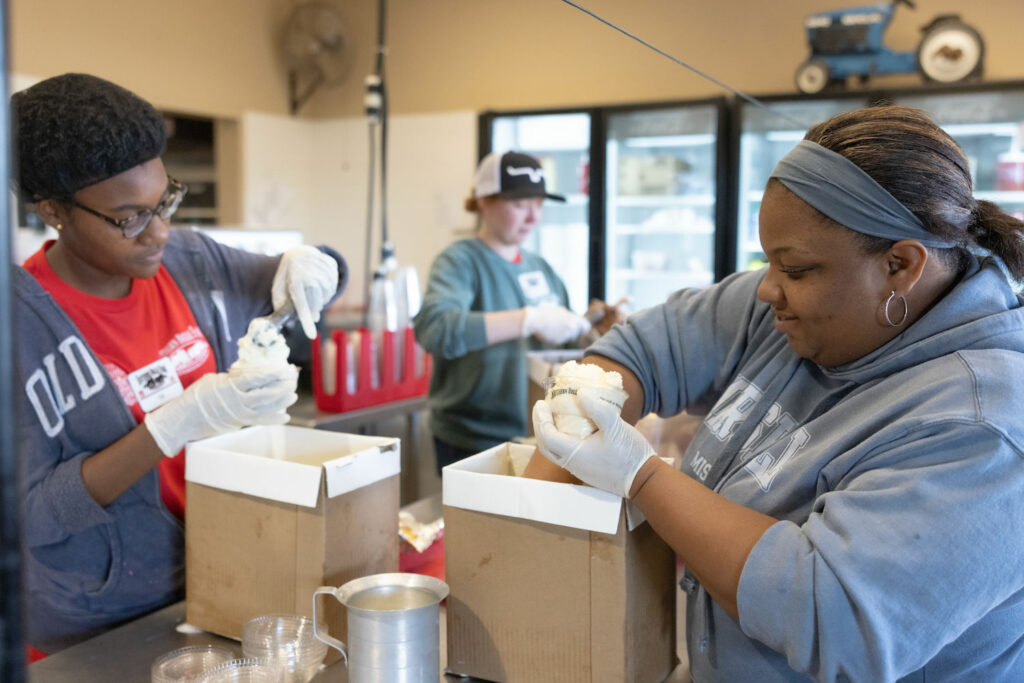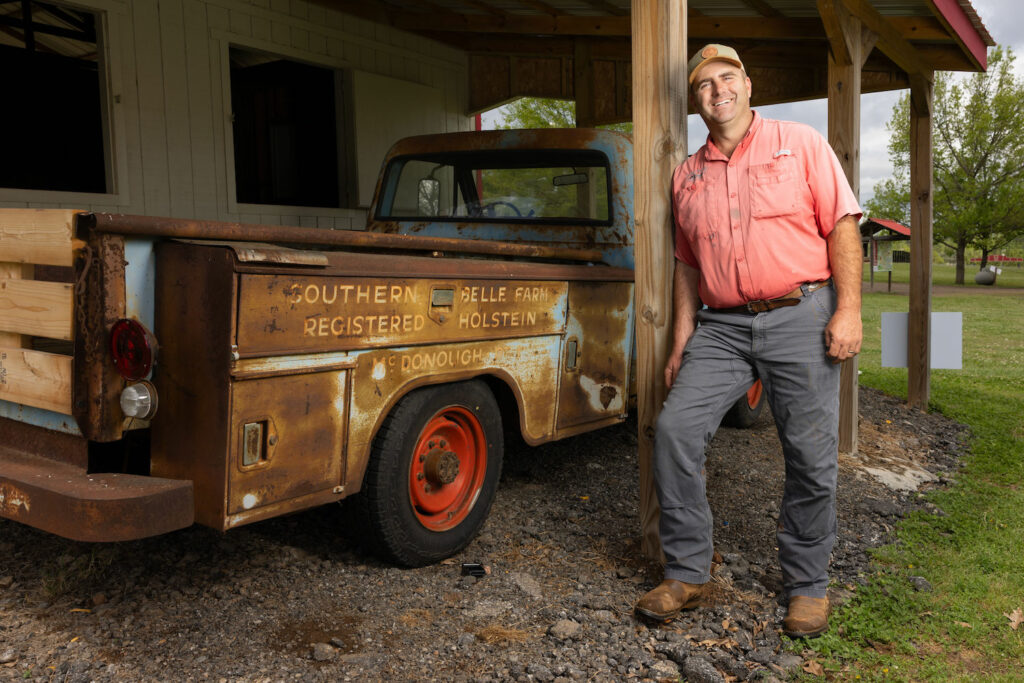You don’t expect it to be here.
Not after passing subdivision after subdivision with names culled from the merging of random adjectives and natural objects: Longleaf, Brightwood, Hickory Hills. But travel far enough down Turner Church Road — a smidge north of the burgeoning Georgia town of McDonough — and the tree-lined spiderweb roads of housing developments open to vast farmland adorned with berry crops and little, red-roofed structures.
“When I was growing up, that road you came in on was a dirt road — kudzu would grow across it,” Jake Carter says, talking about a Henry County from not too long ago. “I remember waking up in the middle of the night if a car came down the road. That’s how rare it was. We were in a very rural part of the county.”
It was like that for the Carter family business, Southern Belle Farm, which officially opened in 1938. From generation to generation, the farm went from cotton to dairy to beef cattle over the next 60 years. But along the way came the interstate, and, in the late 1990s, housing developers. The Carter family home — firmly part of the ever-expanding greater metro Atlanta area — became more valuable for bedrooms than beef cows. Jake was learning management at the Terry College of Business, and for a young man who grew up wanting to maintain the family farming business, he wasn’t sure it was viable.
“When I went to the University of Georgia, we were in a spot here at our farm,” he says. “Henry County was probably one of the fastest-growing counties in the nation, and when I say I always wanted to be a farmer, I never let that dream go. But at that point in the late ’90s, I didn’t think that was honestly going to be in the cards.”
Jake’s father, Jimmy (no relation to the Georgia farmer who became the 39th president), ran Southern Belle’s day-to-day while his mother, Mimi, led a successful catering business. Jake thought when he returned from college, he would join his mom in building up her venture. But all around them, developers were buying land at nearly $60,000 an acre, a sum any landowner would have to consider.
“It’s a lot of money — people look at you and say, ‘Why didn’t you take it? You could have just moved on,’” says Jake (BBA ’03). “But this life is more than just dollars and cents. There’s a certain fulfillment from the dirt and soil that can’t be fulfilled with money in your pocket. We sat down as a family and said, ‘Here’s where we’re at. We could sell it, but then where do we go? We’ve been here for generations. How are we going to be fulfilled and go somewhere else?’”
The timing was opportune. Jake didn’t just bring home a business degree from Athens, he also brought home an entrepreneurial spirit. He had another idea for the family farm that didn’t include selling to developers.
“Agritourism wasn’t seen when I was at Terry,” he says. “But it was an idea that was coming.”
Was it ever.

There’s a belief family businesses fail by the third generation, but that’s not always true. A 2021 article in the Harvard Business Review researched the phenomenon and discovered 74% of family businesses last for 30 years, 46% extend for 60 years, and 33% survive for 90 years or longer. For the latter group, the study cited family choices — thinking in terms of generations to endure the tough times rather than hitting quarterly earnings targets — as the reason for its survival.
In the 86 years of Southern Belle, change and adaptation have proven the keys to its longevity. The farm came to fruition during the Great Depression, when Jake’s great-grandfather, James Arthur Carter, a sharecropper harvesting cotton and corn with his father, William, saved up enough money to buy 50 acres. Instead of staying the course with cotton — not the easiest crop to grow — James pivoted toward dairy, and for the next 48 years with his son James C. Carter and grandson Jimmy, the farm produced milk for various Atlanta dairies. The mid-1980s saw a national milk surplus, so Jimmy (BSA ’69, MS ’73), now at the helm, took advantage of the federal Dairy Termination Program of 1986 and transformed Southern Belle into a beef cattle and hay operation.
Jake was 6 when the dairy closed, and while he doesn’t remember much about milking cows, he has distinct memories of working the cattle farm.
“Growing up on a farm taught me life’s not always gonna be easy,” he says. “I look back, and there were times I wanted to quit doing certain things. It was a hard job. But I learned if you’re gonna start something, you’re gonna finish it, and it’s up to you to put your best foot forward. On the farm, we don’t always work a nine-to-five job — sometimes it’s five to nine. Those are the ideals that were impressed upon me, that were impressed on my mom and dad — it’s a generational thing.”
During Jake’s high school years — back when there were three high schools in Henry County (now 11) — the farm struggled. They were doing hay in the summers, growing little crops here and there, but most of the land sat idle. The same cannot be said for the land around them. The ’90s saw the county more than double in population — from 58,741 to 119,341 — and while the newcomers weren’t farmers, Southern Belle was a place of interest.
The term agritourism is new, but visiting farms to experience agriculture and celebrate harvests dates back centuries, when many farmhouses served as inns for migrating travelers. The business’s recent incarnation ties to the farm-to-table movement, where people want local produce and are curious about where it comes from. In the early 2000s, the U.S. Department of Agriculture expanded its data collection to include income from “agri-tourism and recreational services,” an example of a nascent industry slowly thriving.
Learning more in the first months following graduation from UGA than ever before, Jake found his economics and management lessons started to make sense when applied to the real world. If the next chapter for Southern Belle was agritourism, it would take initiative and support. And it wasn’t going to be easy.
“You have to be willing to change. I think some businesses — and I’ve been guilty of this — refuse to adapt. And when they do that, they’re on their way out,” Jake says. “I’ve seriously thought about how we’ve continued down through the generations. I’ll tell you why that happened — because my dad let me do some things. My dad was always an ally, and he let me run off a few clips. That’s the key — being open-minded and saying, ‘You know what, this may work. Let’s try this.’”

Jake’s 2005 marriage to his wife, Jennifer, coincides with the groundbreaking for the redeveloped Southern Belle Farm — “Our entire marriage has been building this anchor,” he says. The gates officially opened in 2006 for October and included a corn maze, pumpkin patch and educational school tours. Nearly 3,000 customers came out that first year, which meant there was something to this. But the next year, it rained all October, forcing the family to adapt again. “From there, we didn’t go lightly, we didn’t kind of crack the doors open,” says Jake. “We opened them up and started to invest in the farm. We must diversify the time that we’re open.”
That meant growing strawberries for people to pick because it created business in the spring and served as an asset to the Henry County community. Never mind the family didn’t know how to do that. “There was no roadmap,” says Jake. “I didn’t have a dad or grandad who said, ‘Here’s how you grow strawberries.’” They grew a half-acre in 2009, then added blackberries, blueberries and peaches. The idea was to open on April 1 with a portfolio of things for people to pick through spring and summer.
Mother Nature, of course, can override this plan — a freak frost in late March can wipe out entire crops in a flash. So, adapt. There are more things to do on a farm — or develop from what comes from a farm — that bring in a crowd. The Carters opened a market — selling ciders, jellies, honey and pickled peaches — and featured Mimi’s Bakery, with fried pies, pound cakes, apple cider donuts and homemade ice cream. Guests not picking fruit can visit donkeys and horses at Belle’s Barn, ride the cow train, glide down the giant tunnel slide or race pedal carts on a dirt racetrack. Some ideas over the years have worked, others haven’t — but the customer is always in mind.
“I’ve done things early on because I wanted to do them, and I learned a lot of times that wasn’t the right mindset. It was, what do the customers want, knowing what this community wants, and having an ear to that pulse,” Jake says. “In testing that over the years we’ve got a bigger flower business than we’ve ever had.
“There are several businesses within this one business — the bakery, admissions, concessions, U-pick — so we continue to diversify inside that umbrella while not necessarily adding all the legs to the stool.”
In 18 years, the farm went from being open only in October to being open for six weeks in spring, four weeks in summer, six weeks in fall and the four weeks between Thanksgiving and Christmas. Each season offers a new experience, and last year 500,000 people passed through the Southern Belle gates. They come from all over for many reasons.
Always the businessman, Jake does crowd work and asks people where they came in from. On one occasion, he talked to a Michigan couple who flew down for a specific reason.
“I asked them when they got in, and they said, ‘We got in today — we found you online, saw you on social and wanted to have one of your strawberry shortcakes.’ So, they got on a plane, flew down here, rented a car, drove over here, got a strawberry shortcake and went back. And I’m thinking, ‘I want to be like you.’”

A recent sunny spring Sunday saw a line of trucks and cars 50 deep line up along the road shoulder aside the farm a half hour before the gates opened. Once open, the diverse crowd of all ages streamed in, hundreds making a beeline to the strawberry U-pick line.
The farm has two distinct sides — the picking fields on one, the interactive attractions on the other — with the Country Market square in the middle. Once people made their way through the fields for their baskets of berries — which survived winter’s last freeze in late March — they sat in a vast area of shaded picnic tables having lunch or taking pictures atop the massive wooden chair near the food trucks. Families occupied rocking chairs around the front porch of the market before heading to pet donkeys and pygmy goats, mine for gems, trampoline on large yellow pillows of air, or ride the cow train. Educational posters about the importance of soil, crops, and fun facts about dairy cows are throughout the nearly 30 activities, maintaining the family’s mission of promoting agricultural education.
“I tell people all the time, yes, we’re selling produce and strawberries, but ultimately, we’re selling an experience,” Jake says. “Our hope is families will come here, spend time together, have fun and strengthen the family bond. If we can provide a place where we forget about our phones, where families can enjoy spending time together, then our mission is accomplished.”
Jake is surrounded by family, including the more than 150 staff members, many of them Henry County high school students working their first jobs. His sister, Holly Carter Cobb (BBA ’92), runs the farm’s consumer relations, and Mimi remains a constant presence in the bakery named in her honor. Jake and Jennifer live in a house built beyond the berry patches with their three children. His kids love being on the farm but going into the business is not something he’s pushing them to do — he wants them to be their own people.
Which is what his father wanted for him. In late February 2024, Jimmy passed away at 77, having seen the third iteration of his farm become a resounding success. His dependable guidance and gift to his son — and future generations of the Carter family — was opening the doors for transformation. It was something Jimmy’s father would have appreciated.
“I got to speak at my dad’s funeral, and I said, ‘I can guarantee you he’s sitting under the biggest shade tree right now with my granddad, trying to explain to him how he got people to pay money to walk through a cornfield,’” Jake says. “My granddad would have been all over that.”

